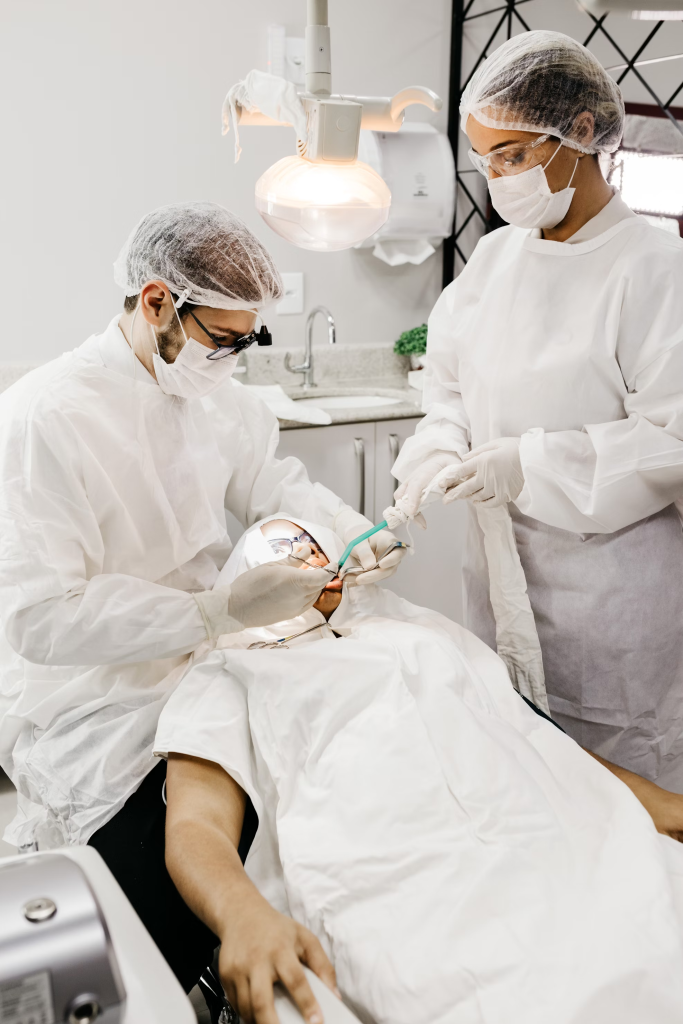Improving oral health is essential for maintaining not only a bright smile but also overall well-being. Good oral hygiene practices can prevent the onset of common dental problems like cavities, gum disease, and bad breath.

It also plays a significant role in preventing more serious conditions such as tooth loss, heart disease, and diabetes complications. The following is a comprehensive guide to the best ways to improve oral health, tailored to Australian practices and considerations.
Click Find Here For More Details
Tips For A Better Oral Health
Brush Your Teeth Regularly
Brushing your teeth is the foundation of any good oral hygiene routine. The Australian Dental Association (ADA) recommends brushing your teeth at least twice a day with fluoride toothpaste. Fluoride helps to strengthen tooth enamel, making it more resistant to decay.
- Correct Brushing Technique: Use a soft-bristled toothbrush to avoid damaging your gums. Hold the brush at a 45-degree angle to your gums and use gentle circular motions to clean all surfaces of each tooth. Don’t forget the back teeth and the gum line, where plaque tends to build up.
- Timing: Brush your teeth for at least two minutes, which is long enough to clean every surface properly. You can use an electric toothbrush for a more consistent and thorough brushing experience.
- Replace Your Toothbrush Regularly: It’s advisable to replace your toothbrush every three to four months or sooner if the bristles are worn down. A worn toothbrush is less effective at cleaning your teeth and gums.
Floss Daily
Flossing is just as important as brushing. While brushing helps to remove plaque and food particles from the surface of your teeth, flossing can reach between your teeth and under the gumline, where your toothbrush may not reach.
- Flossing Technique: Gently slide the floss between your teeth, curving it around each tooth in a C shape. Make sure to floss both sides of each tooth and along the gum line. Avoid snapping the floss between teeth, as this can damage your gums.
- Alternatives to Traditional Floss: If you find traditional flossing difficult, try using dental floss picks, water flossers, or interdental brushes. These can be easier to use, especially for those with braces or other dental appliances.
Use Mouthwash
Mouthwash is a valuable addition to your oral hygiene routine. It can help freshen breath, reduce plaque, and fight bacteria in the mouth. However, mouthwash should not be used as a substitute for brushing or flossing.
- Choosing the Right Mouthwash: Look for a mouthwash that contains fluoride for added protection against tooth decay. Some mouthwashes also contain antibacterial agents like chlorhexidine, which can help reduce gum inflammation and combat gum disease.
- When to Use Mouthwash: Use mouthwash after brushing and flossing. Swish it around your mouth for about 30 seconds to one minute to maximise its benefits.
Eat A Balanced Diet
What you eat plays a significant role in the health of your teeth and gums. A balanced diet with plenty of nutritious foods supports your overall health and keeps your teeth strong.
- Limit Sugary and Acidic Foods: Sugary foods and drinks, including lollies, soft drinks, and fruit juices, can contribute to tooth decay. Sugars feed the bacteria in your mouth, which produce acids that erode your tooth enamel. Acidic foods like citrus fruits and vinegar can also weaken enamel over time.
- Eat Calcium-Rich Foods: Calcium is essential for strong teeth and bones. Include dairy products, leafy green vegetables, nuts, and fortified plant-based milks in your diet.
- Drink Water: Water, especially fluoridated water, is one of the best drinks for your teeth. It helps to rinse away food particles, reduce acidity in the mouth, and keep your gums hydrated.
Visit Your Dentist Regularly
Regular dental check-ups are crucial for maintaining good oral health. The ADA recommends visiting your dentist at least once a year for a thorough examination and cleaning. Regular visits can help detect problems early when they are easier and less expensive to treat.
- Professional Cleanings: Even if you brush and floss regularly, plaque can still build up in areas that are difficult to reach. A dentist or dental hygienist can professionally clean your teeth, removing tartar (hardened plaque) and reducing the risk of gum disease and tooth decay.
- Early Detection of Problems: A dentist can spot signs of problems such as cavities, gum disease, or oral cancer. Early detection is crucial for more effective treatment and better outcomes.
Quit Smoking
Smoking is one of the leading causes of gum disease and can contribute to bad breath, tooth discolouration, and tooth loss. It also impairs your immune system, making it harder for your body to fight off infections, including gum disease.
- Impact on Gum Health: Smoking reduces blood flow to your gums, which can cause them to recede, increasing the risk of tooth loss. Smokers are also more prone to periodontal (gum) disease and other oral health issues like dry mouth.
- Quit for Better Health: Quitting smoking improves your oral health and overall health. The benefits of quitting begin as soon as you stop smoking. Your gums start healing, and your risk of oral cancer decreases over time.
Protect Your Teeth From Injury
Accidents can happen, but it’s important to take precautions to prevent damage to your teeth, especially if you’re active in sports or other activities that might involve injury to the mouth.
- Wear a Mouthguard: If you play contact sports, such as football, basketball, or rugby, wear a custom-fitted mouthguard to protect your teeth from impact. A well-fitting mouthguard can prevent cracked or knocked-out teeth, as well as reduce the risk of injuries to your gums and jaw.
- Avoid Using Teeth as Tools: Don’t use your teeth to open bottles, tear packaging, or perform other tasks they weren’t designed for. Doing so can crack or break your teeth.
Manage Stress
Stress is often overlooked when it comes to oral health, but it can contribute to various dental problems. Stress can lead to teeth grinding (bruxism), jaw clenching, and even gum disease.
- Teeth Grinding: Many people grind their teeth at night without realising it. This can lead to tooth wear, jaw pain, and headaches. If you grind your teeth, speak to your dentist about getting a night guard to protect your teeth while you sleep.
- Gum Disease: Stress can weaken your immune system, making you more susceptible to gum infections. Practising stress-management techniques such as exercise, meditation, or yoga can help maintain your oral and overall health.
Avoid Harmful Habits
There are several habits that can harm your teeth and gums over time. Being aware of them and working to eliminate them can significantly improve your oral health.
- Chewing on Ice or Hard Objects: Chewing on hard objects, like ice or pens, can crack or chip your teeth. Try to avoid this habit, and instead, chew on sugar-free gum if you need something to occupy your mouth.
- Overuse of Whitening Products: While teeth whitening can give you a brighter smile, overusing whitening products can lead to tooth sensitivity and enamel damage. Always follow the instructions carefully and consult your dentist before starting any whitening treatments.
Consider Fluoride Treatments
In addition to brushing with fluoride toothpaste, fluoride treatments can provide an extra layer of protection for your teeth. These treatments are particularly beneficial for people at higher risk of tooth decay, such as those with dry mouth or a history of cavities.
- Fluoride Varnish: A fluoride varnish is often applied by dentists during routine check-ups. This treatment strengthens enamel and helps prevent cavities.
- Fluoride Mouth Rinses: Some mouth rinses contain fluoride, which can be beneficial for individuals who are more prone to cavities. Ask your dentist if fluoride rinses are a good option for you.
Conclusion
Improving your oral health is a lifelong commitment, but with regular attention to your dental habits, you can ensure your teeth and gums stay strong and healthy.
Brushing, flossing, eating a balanced diet, quitting smoking, and visiting the dentist regularly are all essential practices for maintaining good oral hygiene.
Additionally, protecting your teeth from injury, managing stress, and avoiding harmful habits can further contribute to a brighter, healthier smile.
By following these steps, you can reduce the risk of common dental problems and maintain optimal oral health for years to come. Don’t forget, taking care of your teeth is not just about aesthetics—it’s about enhancing your overall health and quality of life.
Frequently Ask Question
What’s The Best Way To Whiten My Teeth?
The best way to whiten your teeth is by visiting your dentist for professional whitening treatments. These treatments are safe and effective and can offer more dramatic results than over-the-counter products.
At-home whitening products can be effective, but be sure to follow the instructions carefully to avoid damaging your enamel. It’s also important to maintain good oral hygiene and limit foods and drinks that stain teeth, like coffee, tea, and red wine.
How Can I Protect My Teeth From Injury?
To protect your teeth from injury, consider wearing a custom-made mouthguard if you play contact sports or engage in activities with a higher risk of mouth injury.
Avoid using your teeth to open bottles, tear packaging, or chew hard objects like ice, which can cause cracks and chips. If you grind your teeth at night (a common problem known as bruxism), speak with your dentist about getting a night guard to prevent damage.
What Should I Do If I Have A Toothache?
If you have a toothache, the first step is to see your dentist as soon as possible to identify the cause. In the meantime, you can rinse your mouth with warm saltwater to reduce swelling and discomfort.
Over-the-counter pain relievers like ibuprofen can help manage the pain, but avoid placing aspirin directly on the tooth or gum. If the pain is severe or persistent, it could indicate a more serious issue like an infection or cavity that requires professional treatment.
